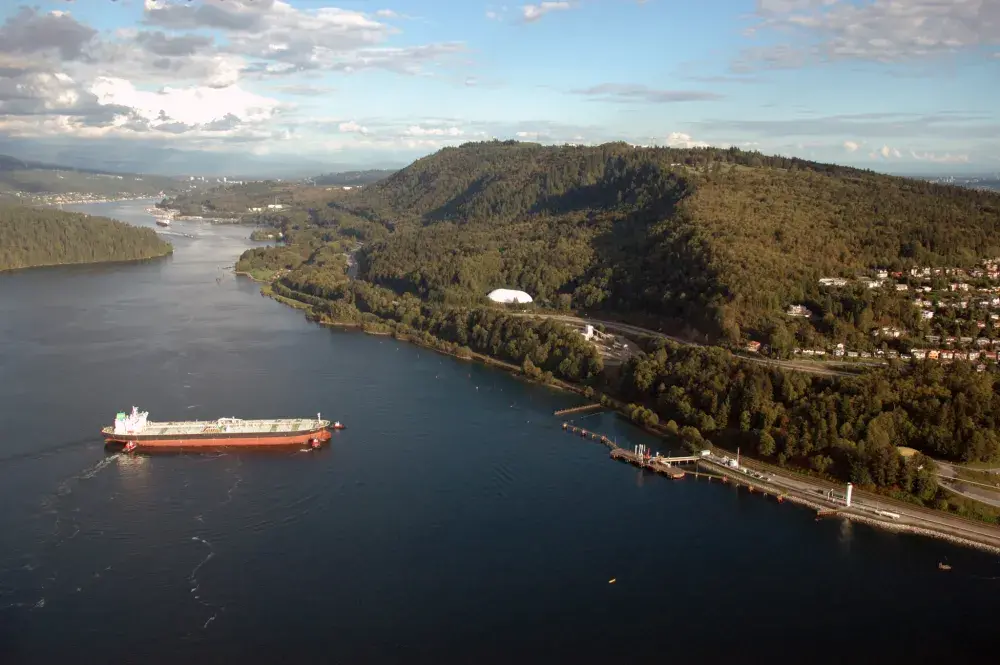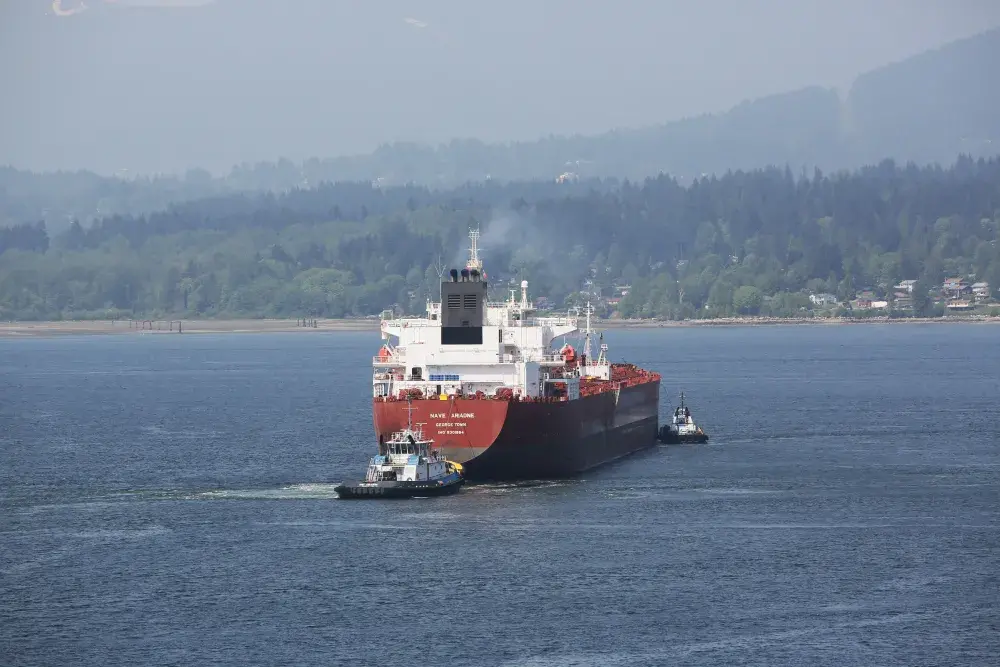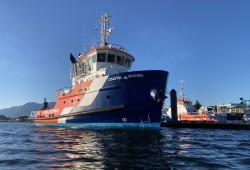After more than a decade of development and construction, the expansion of the Trans Mountain pipeline was completed early this month. For coastal residents, this means that the number of tankers passing by southern Vancouver Island increases from five to 34 a month.
With over $30 billion in construction costs, the project twinned the existing Trans Mountain pipeline, which has operated since 1956. The 1,150-kilometre route extends from northeast of Edmonton to the Westridge Terminals in Burnaby, and the recently completed expansion brings its daily capacity from 300,000 to 890,000 barrels of petroleum product a day. The federal government purchased the project for $4.5 billion in 2018 to ensure it moves forward.
Using 245-metre Aframax tankers, this increased funnelling through the pipeline is expected to multiply shipping, increasing from an average of five to 34 vessels a month. This represents a 14 per cent overall increase in marine traffic at the Port of Vancouver, according to Trans Mountain.
Since the mid-1950s 84 spills have been reported from the pipeline, including nine in which over 1.5 cubic metres of oil leaked. But no petroleum product was reported to have spilled from tankers over the 68 years of Trans Mountain’s operation, according to the company.
But while the project is intended to open Alberta’s oil to overseas Asian markets, First Nations whose territory lies along the pipeline and shipping routes bear most of the risk, according to the National Energy Board’s Crown Consultation and Accommodation Report.
“[O]ver the life of the project the probability of small spills is high,” stated the NEB. “The Crown acknowledges that Aboriginal peoples who rely on subsistence foods and natural resources are at greatest risk for adverse effects from an oil spill regardless of its size.”
Tankers from the end of Trans Mountain pass through the Juan de Fuca Strait, past Port Renfrew and south of Nitinaht Narrows before heading across the Pacific or down the US coast. Despite this increased traffic, a past report from the NEB determined that the tankers would have a “minor” impact on fishing in Ditidaht territory, while the effect on Maa-nulth nations on Vancouver Island’s west coast would be “negligible”.
Even so, Trans Mountain spent a great deal of time negotiating with First Nations during the project’s development, as 129 were listed as being potentially impacted by the pipeline and its tankers. Mutual benefit agreements were signed with 69 Indigenous communities, including the Pacheedaht and Ditidaht, who submitted letters of support for the project. These confidential agreements can include education in pipeline construction, jobs training, business opportunities as well as improvements in community services and infrastructure.
For the Ditidaht, Trans Mountain funded a 28-foot landing craft that the First Nation launched in Nitinaht Lake in the summer of 2022. Valued at $415,000, the vessel was acquired to move personnel and equipment around to assess and map natural resources.
The Indigenous Advisory and Monitoring Committee was formed to ensure that the project upholds its commitments to Aboriginal communities that could be impacted.
"We stand at a pivotal moment where collaboration and diligence are paramount," said Trina Sxwithul’txw, chair of the Marine Shipping Subcommittee of the IAMC, when the Trans Mountain expansion was completed early in May. "Our marine environment, a vital resource for our communities and what makes us whole as a people, demands our focused protection as tanker traffic increases. We call on all parties involved—governmental bodies, industry stakeholders, and the communities affected—to continue to find common ground in safeguarding our shared environment."
The IAMC is composed of six representatives from federal departments and agencies, with 13 others speaking for their Indigenous communities. The committee’s current representative for the west coast of Vancouver Island is Benjamin Gillette, chief councillor of the Ka:'yu:'k't'h'/Che:k'tles7et'h' First Nations.
As the expansion project was being developed, the capacity of the West Coast Marine Response Corporation increased dramatically to handle shipping accidents in the Pacific. The industry-funded organization now has bases in Vancouver, Richmond on the Fraser River, Coquitlam, Prince Rupert, Nanaimo, Sydney, Beecher Bay and Port Alberni. Serving the west coast of Vancouver Island, the Port Alberni base has seven vessels, plus another two that are stationed in Ucluelet.
With six new bases and more staff, the WCMRC’s response time to a spill has been reduced to six hours on the tanker shipping lanes and two hours in the Port of Vancouver, said the company’s communications manager Michael Lowry.
“As part of our expansion to prepare for the increased tanker traffic, we have doubled the size of our staff (from 100 to 200) and the size of our fleet (from 44 to 88 vessels),” he wrote in an email to Ha-Shilth-Sa.
The marine response corporation attends to an average of 20 spills a year. In the summer of 2022 this included a diesel spill from a gillnet fishing boat in the Alberni Inlet. The 34-foot vessel capsized on rocks near Nahmint Bay with approximately 500 litres of diesel fuel on board. The WCMRC positioned booms around the vessel to contain the leaking diesel, while absorbing the fuel with sorbent pads that were placed in the containment area. After the leaking ceased, the fishing boat ended up being left in the inlet when it became completely submerged.



